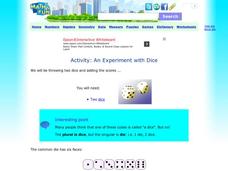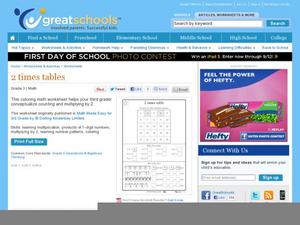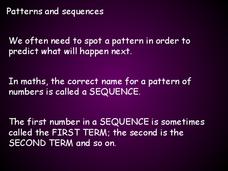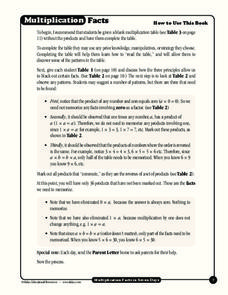Curated OER
Activity: An Experiment with Dice
Roll the dice with this activity and teach young mathematicians about probability. Record outcomes for rolling two number cubes in order to determine what is most likely to happen. Graph the data and investigate patterns in the results,...
Curated OER
Patterns in the Multiplication Table
Explore patterns in the multiplication table in order to deepen your third graders' understanding of this essential skill. Implement this activity as a whole-class lesson plan, allowing students to work in pairs or small groups to...
Curated OER
Making a Ten
An addition table supports third graders as they learn strategies to improve their math fluency. When finding sums greater than ten, students are taught how to first make a ten and then add on the rest. A similar method is also...
DK Publishing
Using the 5 Times Tables, Part 2
Practice the five times table with frogs! After a lesson on multiplying by five, have your third graders draw a line between a group of frogs and the product of the multiplication problem. The numbers go up to 50, which helps learners...
DK Publishing
Using the 2 Times Tables
If your third graders have a hard time with multiplication, visualizing the problems might help. Six problems show learners how to count pairs of boxes to solve multiplication with the two times table. At the end, they draw boxes to...
DK Publishing
2 Times Tables
Third graders count, multiply, and color their way to success. Not only do they practice multiplying two by various numbers, they color in a table to fully understand the two-times table, as well as counting sets of two ears on different...
DK Publishing
Multiplying and Dividing by 10, Part 3 - Using the 10 Times Table
Challenge your third graders on the 10 times tables. Given three numbers at the top of each table, learners fill in the missing numbers to complete three more multiplication and division problems. This resource is a great way to extend...
Curated OER
Counting by 3s, 4s, and 5s
Can learners recognize the pattern in these number sequences? Here's a hint: it's skip counting by either three, four, or five. There are three examples at the top demonstrating each of these, and scholars complete 15 number sequences to...
DK Publishing
Finding Multiples 2, 5, and 10
Solidify multiplication facts by identifying multiples of two, five, and 10. There are six sets of numbers here, and for each set learners circle those that are multiples of one of these numbers (two sets for each). Use the example to...
DK Publishing
2 Pairs of Feet - Multiplying by 2
Introduce mathematicians to multiplication through counting sets of feet. Start by asking them, "How many feet are in this classroom?" See if they notice that it's easier to count pairs rather than individual feet. Scholar use the...
DK Publishing
4 Times Table
It's all about the fours as scholars practice their multiplication facts. They skip count on a number chart, shading in each multiple of four. Do they notice a pattern? Next, scholars complete five number sentenes multiplying four by...
DK Publishing
3 Times Table
This 25-chart will give mathematicians a chance to detect patterns as they shade in every multiple of three by skip counting. They solve multiplication number sentences involving three and the numbers 1-5 (one is done for them.) Finally,...
DK Publishing
5 Times Table
Get scholars familiar with the fives multiplication facts using a hundreds chart and number sentences. They skip count by five on the chart, coloring in all numbers that are multiples of five. Do they see a pattern? Next, learners...
Curated OER
Sequences
Provide your class with a comprehensive set of examples that help define sequences. They view a wide variety of sequences that range from animals, to letters and sounds. They work through each sequence to determine what should come next....
Curated OER
Patterns and Sequences
A very well done slide-show defines and explains how numeric patterns and sequences work. Academic vocabulary is highlighted as well as solid examples and whole class practice. The last slide contains four number sequences for the class...
San Jose Unified School District
Multiplication Chart
Looking to support your young mathematicians with mastering their multiplication facts? Then this set of multiplication charts is a great place to start, allowing children to visualize the the relationships between factors and multiples.
IXL Learning
Small Times Table Reference Charts
Support young mathematicians on their journey to fluent multiplication with these handy reference tables. Small enough to fit in their pockets, these charts allow children to practice their multiplication facts anywhere they go.
Didax
Multiplication Facts
Learning their multiplication facts is a big step in the education of young mathematicians. Help achieve this goal with the support of this collection of instructional materials.
World Wildlife Fund
Take 6
Investigate the various properties of the number six with this elementary math lesson. From simple addition, subtraction, multiplication, and division problems to the creation of hexagonal tessellations, this lesson covers all aspects of...
Curated OER
Addition Patterns
Use a learning activity with your youngsters in order to establish an understanding of patterns in a small addition table. Help learners recognize that adding two odd numbers will produce an even number, and adding two even numbers will...
Curated OER
No Foot, No Horse
Why do horses wear shoes? Why do people wear shoes? Using worksheets, which are embedded in the plan, learners write descriptive paragraphs about their own shoes, classify a pile of shoes, and also engage in math games about the variety...
Curated OER
Patterns Patterns Everywhere
Upper graders work with number patterns. In this pattern lesson, learners recognize and continue number patterns and find the rules. They do some as a class and complete an assessment.
Math Salamanders Ltd.
Counting on by Digits Sheet 2
In this number sequence activity, learners fill in 40 missing numbers in sequence on 10 different number lines. Students calculate each single-digit step up for each one.
Math Salamanders Ltd.
Adding 1s, 10s, 100s, and 1000s
In this addition activity, students complete a 13-row chart. They start with three or four-digit numbers and add 1, 10, 100, or 1000 to each number to fill in the chart. The last four questions require subtraction because the initial...

























